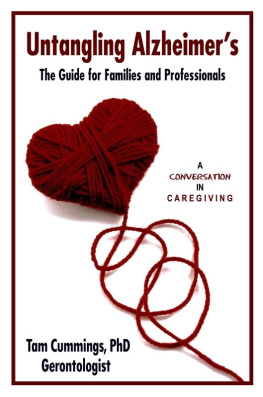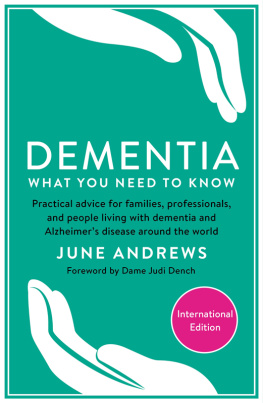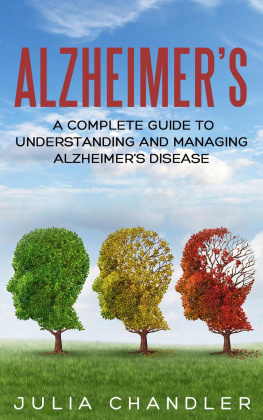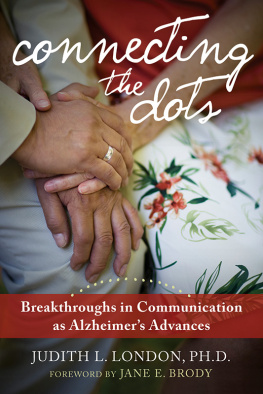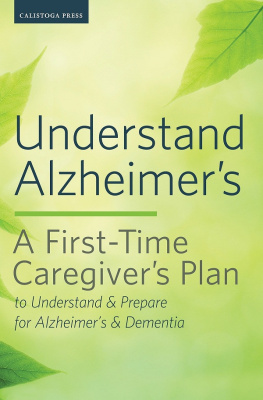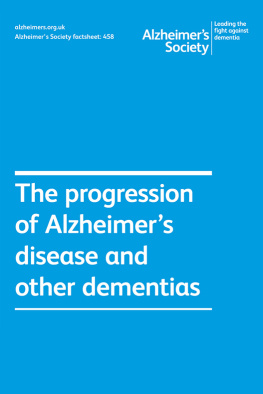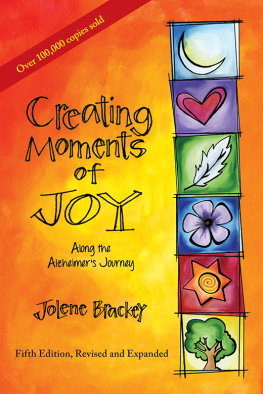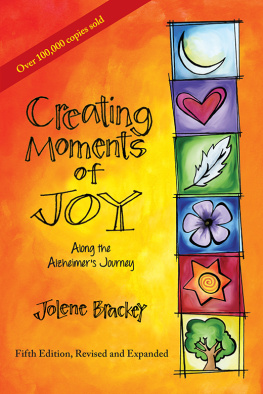Untangling Alzheimer's
Copyright 2008, 2012, 2013, 2015 Tam Cummings LLC. All Rights Reserved.
Published in the United States by The Dementia Association LLC.
All rights reserved.
Printed in the United States of America.
No part of this book, either in its published or electronic format, may be reproduced in any manner whatsoever, stored in a retrieval system, distributed or transmitted in any form or by any means, including electronic, mechanical, photocopying, recording, scanning or otherwise, without the prior written permission of the publisher, except in the case of brief quotations embodied in critical articles and reviews and certain other noncommercial uses permitted by copyright law. For permission requests, email the Publisher via The Dementia Association LLC.
Library of Congress Control Number: 2013936678
CreateSpace Independent Publishing Platform
North Charleston, South Carolina
Cummings, Tam, 1961-
Untangling Alzheimers: The Guide for Families and Professionals/Tam Cummings 2nd edition
ISBN: 0985445033
ISBN 978-0-9854450-3-4 (softcover)
eISBN: 978-0-9854450-2-7
1. Dementia. 2. Alzheimers Disease. 3. Health Education. 4. Aging. 5. Mental Health
Second Edition
10 9 8 7 6 5 4 3
To my mother
Margie L. Cummings
who taught me this:
And now abideth faith,
hope and charity, these three,
but the greatest of these is charity.
1 Corinthians 13:13, KJV
Untangling Alzheimers is a very welcome addition to information available to the public, healthcare providers and especially caregivers on disorders of the brain that leave the individual cognitively and physically impaired and requiring full-time care.
Tam Cummings uses her extensive experience in dementia to take the reader, at a very personal level, along the path of observation and caring, in a way that makes a complex disease and the role it plays in the lives of the individual, family, caregivers and friends, much more understandable.
Although Untangling Alzheimers is predominantly focused on Dementia of the Alzheimers Type, it provides the necessary information to understand the very similar mental and physical declines found in many other forms of dementia.
The book is easy to read and provides very valuable information, along with case examples of the various stages of cognitive and personality decline that inevitably occur in dementia. It especially provides very useful tips for the reader on behavior and communication problems that commonly occur in dementia and suggests different ways to cope and adjust for them.
The section on dying is very special, because it describes the last stages of dementia in a very humane and informative way so that the readers feel that their loved one has been treated and cared for in the best possible manner and will now rest in peace.
Tam does a superb job in Untangling Alzheimers with her personal skill, experience and caring dialogue. It makes it seem as though she is in the room with the reader. This book is a must read for those who know or care for a person with dementia.
Ronald Devere, MD, FAAN
Board Certified Neurologist
Director, Alzheimers Disease and Memory Disorders Center Austin, Texas
I would like to thank the friends and colleagues who have provided support and guidance throughout the process of producing this book. Ronald Devere, M.D. and Dennis Myers, Ph.D., are two gifted men who continue to teach and mentor me.
My friends and colleagues: Carla Cochran, RN, CALM, Susan Frederickson, Terria Jones, CALM, Diane McKinnon and Glenda Rodgers, provided input and critical feedback as professionals who work every day with family and professional caregivers and persons diagnosed with dementia.
Mary and Key Norris, Frank and Sally Martin, John Turner, Mary LaTouf, Pat Cutrone, Robyn Seiferth, Heidi Green and Helen Hooper: as family caregivers you offered me insights into your loved ones lives and helped me grow as a professional. Thanks to you all.
To my spouse Lt. Col. Tammy L. Knott, (U.S. Army Retired) your love and support allows me to help so many families and professionals.
Edited by Erin Dewald.
The information and stories in this book are designed to take the fear and mystery out of a dementia diagnosis and explain a complex disease process in a way that will make sense to a family or professional caregiver. The first two chapters will describe the overall picture and history of dementia and Alzheimers disease, the most common form of dementia. Additional chapters will explain how specific behaviors are a result of the disease impacting the brain, rather than a deliberate action or choice by the person with the disease. The content of this book will help guide you through the dementia process and explain the disease from the diagnosis to death and hopefully assist you in being the best caregiver possible.
The contents will also walk you through the stages of the disease, allowing you to identify the behaviors and changes as they are related to brain damage in the four lobes of the brain. It will cover specific techniques you can use to communicate and work with persons who have a dementia diagnosis, including how to approach, talk to, or provide activities for your loved one. And finally, it will explain the changes in the body during the final year of life and explore what feelings you can expect as a family member as you grieve for your loved one.
As we go forward in this book, I will use the feminine forms of words (e.g., she, her, mom) to avoid confusion. This is not to suggest women are at a higher risk for dementia than men. We see more female dementia patients than males because women statistically outlive men. Since women live longer, more women will develop dementia in some form. At the same time, some forms of dementias may be found more often in males, such as CADASIL, Lewy Bodies Dementia or Behavioral Variant Frontal Temporal Dementia. Otherwise, dementias affect about the same percentages in both sexes.
I fully recognize not everyone is dealing with an ill parent. Many of you are caregivers of spouses or siblings or neighbors or are court-appointed guardians or case managers. The experience for each of you will be different because of the varied emotions that come with each relationship, so please do not be offended by the use of the feminine noun.










